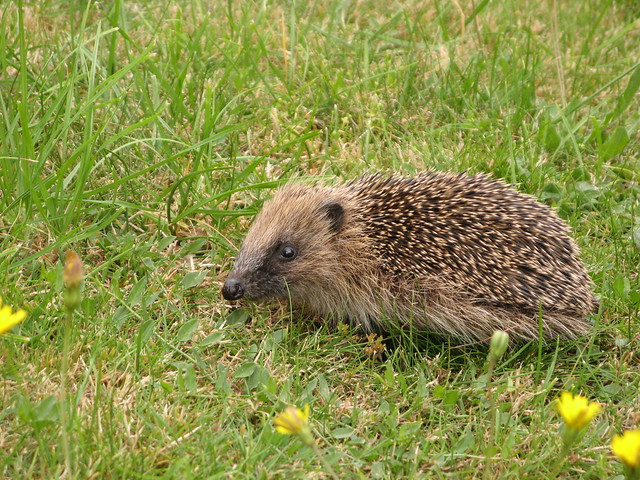Words for deer in Celtic languages. There were several different words for deer in Proto-Celtic: *wēdus, *karwos, *ellan(t)ī-, *danī- and *yorkos, and also *sidos (stag). They may have referred to different types of deer, but it is not certain which types, apart from *yorkos, which is a roe deer.

| Proto-Celtic |
*wēdus [ˈweː.dus] = wild |
| Old Irish (Goídelc) |
fíad [fʲiːa̯ð] = wild animals, game, especially deer |
| Irish (Gaeilge) |
fia [fʲiə] = deer |
| Scottish Gaelic (Gàidhlig) |
fiadh [fiəɣ] = deer |
| Manx (Gaelg) |
feeaih = deer |
Etymology: from the Proto-Indo-European *weydʰ- (wood, wilderness) [source].
| Proto-Celtic |
*karwos = deer, stag |
| Gaulish |
caruus / carvos = deer |
| Old Irish (Goídelc) |
carbh = deer |
| Irish (Gaeilge) |
carria / cairrfhiadh = deer, stag |
| Scottish Gaelic (Gàidhlig) |
cair-fhiadh / carbh-fheadh = hart, stag |
| Manx (Gaelg) |
çharroo = stag |
| Proto-Brythonic |
*karw = deer, stag |
| Old Welsh |
*caru = deer |
| Middle Welsh (kymraec) |
caru, carv, carw = deer, hart, stag |
| Welsh (Cymraeg) |
carw [ˈkaru / ˈkaːru] = deer, hart, stag; lord, nobleman, patron |
| Old Cornish |
caruu = stag |
| Middle Cornish |
carow = stag |
| Cornish (Kernewek) |
karow = stag |
| Middle Breton |
caro, qaro = deer |
| Breton (Brezhoneg) |
karv = deer |
Etymology: from the Proto-Indo-European *ḱerh₂wós, from *ḱerh₂- (horn) [source].
| Proto-Celtic |
*sidos = stag |
| Old Irish (Goídelc) |
séd = deer |
| Welsh (Cymraeg) |
hydd = stag, hart |
| Breton (Brezhoneg) |
heizes = roe-deer, venison, intrepid boy |
Etymology: uncertain
| Proto-Celtic |
*ellan(t)ī- / *agliones = deer |
| Old Irish (Goídelc) |
ag [aɣ] = bullock, cow, ox; deer, stag |
| Irish (Gaeilge) |
agh = cow, ox
agh alla = deer |
| Scottish Gaelic (Gàidhlig) |
agh [ɤɣ] = heifer, hind |
| Welsh (Cymraeg) |
eilon/eilion = stag, hart |
Etymology: possible from the same root as the English word eland (a type of antelope found in South Africa), which from the Dutch eland (elk), from the Old High German elent.
| Proto-Celtic |
*ou̯ījkā = ? |
| Gaulish |
cerua = ? |
| Old Cornish |
euhic = hind, deer |
| Old Welsh |
eguic = hind, deer |
| Welsh (Cymraeg) |
ewig = hind, doe, roe; graceful light-footed woman; deer, hart |
Etymology: possibly from the Proto-Indo-European *h₂ówis (sheep) [source]
| Proto-Celtic |
*yorkos = roebuck, deer |
| Gaulish |
iorkos = deer |
| Proto-Brythonic |
*jorx = deer, stag |
| Welsh (Cymraeg) |
iwrch [jʊrχ] = roe-deer, roebuck |
| Old Cornish |
yorch = roe-deer |
| Cornish (Kernewek) |
yorgh = roe-deer |
| Old Breton |
iorch = roe-deer |
| Breton (Brezhoneg) |
yourc’h = roe-deer, venison, intrepid boy |
Etymology: from the Proto-Indo-European *york- (antelope, gazelle) [source].
| Proto-Celtic |
*danī- = deer |
| Welsh (Cymraeg) |
danas = deer, fallow deer |
| Breton (Brezhoneg) |
demm = deer, fallow deer |
Etymology: related to the French daim (hind, doe), from the Latin dāma (fallow deer, buck, doe) [source]
Words marked with a * are reconstructions.
Sources: Wiktionary, Am Faclair Beag, MacBain’s Dictionary, In Dúil Bélrai English – Old-Irish Glossary, teanglann.ie, On-Line Manx Dictionary, Geiriadur Prifysgol Cymru, Gerlyver Kernewek, Dictionnaire Favereau




